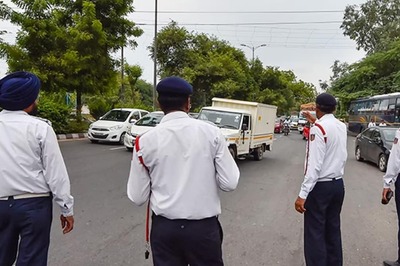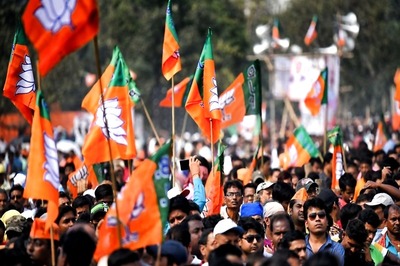
views
The fourth wave of Covid-19 has taken hold in Germany, as the country rushes to placate its debilitating effects. Chancellor Angela Merkel has asked unvaccinated people to get the jab, calling it a “duty to the rest of society to protect others”.
Coronavirus case numbers have surged across Europe in recent weeks, with experts worrying that health systems risk once again being overwhelmed, in part because unvaccinated people are still spreading the disease to the older and more vulnerable.
According to a report by the New York Times on the current Covid-19 situation in Germany, unvaccinated people are ‘leading’ its fourth wave. It says that the University Hospital of Giessen, one of Germany’s foremost clinics for pulmonary disease, is at capacity, with the number of Covid-19 patients tripling in recent weeks, and nearly half of them are on ventilators. The scary part? Every single person is unvaccinated.
The US, which recently grappled with surging infections in May and June, reported many fatalities due to the disease. However, the catch was – nearly all of them were unvaccinated people. Most developed countries began their vaccination drive against Covid-19 late last year. However, they still face problems in vaccination coverage, more due to a social resistance to the jab, than a lack of the life-saving shots. Richer countries have also moved towards providing a third ‘booster’ shot to its population to tackle waning immunity, a move criticised by the World Health Organisation on the basis of vaccine equity.
So as various nations report a surge in Covid-19 infections, here’s a look at how vaccinations, or more so the lack of them, play a role in coronavirus waves:
An ‘Evolutionary Race’ We Can’t Afford to Lose
The Delta variant, with its increased fatality-rate and transmissibility has been a cause of concern for the world. The virus, since the start of the pandemic, has been evolving to a scary degree and is becoming more lethal than its original form. In such a scenario, experts say that unvaccinated people help more mutations occur.
But how does this happen? One of the key characteristics of the coronavirus is the spike protein that allows it to latch onto a host cell, penetrate it, and cause an infection.
That spike is what vaccines target to block the virus.
In the unvaccinated, however, the virus gets in, hijacks the cell, and turns it into a factory. It then makes thousands of copies of itself. If there’s a copying mistake or error, scientists call that a mutation.
Occasionally, a mutation can help the virus get into the body’s cells more easily. When mutations accumulate over time, new variants of a virus strain emerge.
Burdened Healthcare Systems
The Covid-19 vaccine is not a surefire way of preventing infection. However, it is definitely assured that getting the jab may reduce the severity of life-threatening symptoms in a patient.
An onslaught of Covid-19 waves around the globe, including the second wave India saw in March and April this year, have produced horrifying realities of burdened healthcare systems. Reduced severity of an infection helps reduce hospitalisation numbers, further helping countries to effectively mitigate the effects of a rising wave.
Why Don’t People in Many Developed Countries Want to Get Jabbed?
In that German hospital facing the brunt of fourth wave, Dr. Susanne Herold asks every patient why they did not get vaccinated. “It’s a mix of people who distrust the vaccine, distrust the state and are often difficult to reach by public information campaigns.”
Misinformation campaigns and mistrust for the state are reasons for people being unvaccinated in the US, as well. The country, which has seen many protests against the jab, mostly by right-wing led groups, has often led the toll of the infection.
Ross Bagne, a 68-year-old small-business owner in Cheyenne, Wyoming, was eligible for the vaccine in early February this year but didn’t get it. He died June 4, infected and unvaccinated, after spending more than three weeks in the hospital, his lungs filling with fluid. He was unable to swallow because of a stroke.
“He never went out, so he didn’t think he would catch it,” said his grieving sister, Karen McKnight. She wondered: “Why take the risk of not getting vaccinated?”
The New York Times report mentions how the German rate lags because of pockets of vaccine resistance that are not limited to, but especially deep, in the former Communist east, where the far-right Alternative for Germany party is strong. Tino Chrupalla and Alice Weidel, the AfD’s parliamentary group leaders, are both proudly unvaccinated — and have both tested positive for the virus in recent weeks.
“What we are experiencing is, above all, a pandemic of the unvaccinated,” said Jens Spahn, the minister of health, earlier this month.
Infections have also increased in parts of Bavaria and Baden-Württemberg, two wealthy southern states that are home to a loud anti-anti-virus protest movement known as the “Querdenker,” or “contrarians.”
“We have two viruses in the country,” Markus Söder, the Bavarian governor, said in a television debate recently. “We have coronavirus and we have this poison, which is being spread on a massive scale,” he said referring to misinformation about vaccines.
‘Preventable Deaths’
In May this year, Andy Slavitt, a former adviser to the Biden administration on COVID-19, suggested that 98% to 99% of the Americans dying of the coronavirus are unvaccinated.
Add to this CDC Director Dr Rochelle Walensky statement around the time that the vaccine is so effective that “nearly every death, especially among adults, due to COVID-19, is, at this point, entirely preventable.” She called such deaths “particularly tragic.”
An ‘Unvaccinated’ Pandemic in Russia Too
Russia, which is currently also facing a scary surge of infections and burdened healthcare, has been trying to increase its vaccination figures. According to a survey, three out of every four unvaccinated Russians do not intend to get vaccinated against the coronavirus, despite the government’s efforts to increase the population’s stubbornly low uptake.
The international pollster released the findings as Moscow and five Russian regions went into a partial lockdown in October, two days before nationwide restrictions began. According to reports, the Kremlin is planning to relaunch its failed vaccination campaign, but the Kremlin later denied this.
With inputs from the Associated Press, New York Times.
Read all the Latest News here



















Comments
0 comment